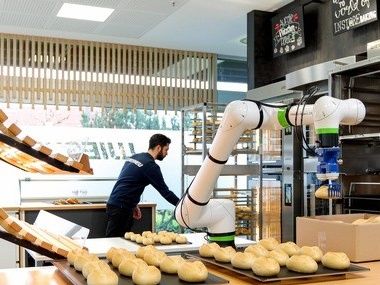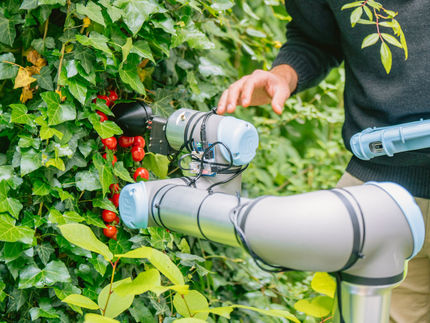Robots work in the bakery
Bakisto relieves employees and reduces food waste
They come from industry, but are now also used in laundries and on farms. Now robots could be making their way into bakeries or bake stores. The world's largest robot manufacturer FANUC, the baking oven manufacturer WIESHEU and the retail specialist Wanzl have jointly developed the automatic system "Bakisto", which could relieve supermarket and discount store employees and reduce food waste in the future. In the process, a robot takes over important work steps from loading the baking tray to inputting and removing the tray from the oven to stocking the displays.

Bakisto relieves employees and reduces food waste.
FANUC Europe GmbH
"The increasing shortage of skilled workers is causing interest in robots to grow outside of industry," says Ralf Völlinger, General Manager Robot Business Division at FANUC Europe. "Particularly in retail or in the skilled trades, where many work steps have been performed manually up to now, robots can bring noticeable relief." Last but not least, employees would also benefit from this, for example through more attractive working hours. In the case of "Bakisto," for example, a collaborative robot (cobot) starts baking independently early in the morning if programmed appropriately - and employees can sleep longer.
Artificial intelligence determines production volume
The robot system also helps to combat food waste. That's because Bakisto uses artificial intelligence to calculate how many rolls, croissants or pastries are likely to be in demand during the course of the day, prepares the baked goods and takes them out of the oven at the right time. "Sales volumes are highly dependent on the weather, school vacations or events. Our system takes this data into account and bakes appropriate quantities," Völlinger adds. This means less stress for employees, he says, because they don't have to constantly keep an eye on the displays and ovens and can concentrate on other tasks.
The trend toward robots in a wide variety of economic sectors is reflected in the figures of the robotics association IFR (International Federation of Robotics). In 2021 alone, 517,000 robots were installed worldwide, according to the IFR. Although the share of cobots has so far been in the single-digit percentage range, the growth prospects for these collaborative robots are good. Because they usually do not require protective fences and are easy to program, cobots are considered particularly flexible and allow easy entry into automation. FANUC has responded to the growing demand by adding 11 cobot models to its portfolio in recent years. In total, the company has more than 100 models on offer and produces around 10,000 robots per month.
Note: This article has been translated using a computer system without human intervention. LUMITOS offers these automatic translations to present a wider range of current news. Since this article has been translated with automatic translation, it is possible that it contains errors in vocabulary, syntax or grammar. The original article in German can be found here.
Other news from the department business & finance
Most read news
More news from our other portals
See the theme worlds for related content
Artificial intelligence (AI) for food and beverages
Artificial intelligence (AI) is optimizing the food and beverage industry through automated quality control and more accurate demand forecasting. AI plays a particularly important role in product development by analyzing taste preferences and market trends. This allows new products to be developed that are better tailored to consumer needs, increasing efficiency and customer satisfaction.

Artificial intelligence (AI) for food and beverages
Artificial intelligence (AI) is optimizing the food and beverage industry through automated quality control and more accurate demand forecasting. AI plays a particularly important role in product development by analyzing taste preferences and market trends. This allows new products to be developed that are better tailored to consumer needs, increasing efficiency and customer satisfaction.






























































